|
During the continuance of the late severe frost, when few or no wood boats could come to town, a great number of families were much distressed for the want of fuel, which rose to a most enormous price; and still keeps up extravagantly high, tho' the weather has considerably moderated, and many wood boats have arrived, which sold their loads to great advantage. The corporation of the city, sent out a great number of sleighs, to bring wood out of the country, for the relief of the inhabitants. Independent Gazette, or the New-York Journal Revived (New York, N. Y.), January 24, 1784 TO BE SOLD, At public vendue, on Wednesday the 10th of March next, if not disposed of before at private sale; THAT excellent House and Store, belonging to the estate of the late Theodorus Van Wyck, Esc; and in which he lived. -- Its situation is most delightful, commanding a view of the shipping, and of Long-Island, never to be obstructed, as it faces the Coenties market place. -- It has great conveniences, the lot running through into Duke-street, where the stores are adapted for loading and unloading carts. -- It is an excellent stand for business, more especially for those connected with the North-river and Jersey trades. To those who know this city, all encomiums are needless; and strangers may receive every necessary information, by applying to Mrs. Helena Van Wyck, at No. 33, corner of William-street, Maiden-lane. Independent Gazette, or the New-York Journal Revived (New York, N. Y.), February 14, 1784 p. 74 [mid-January, 1784] Tired from the toil of the trip [from Philadelphia, through New Jersey] and having formed some acquaintances in New York, I thought I would visit Boston and then return to New York, whence I would embark for England. The harshness of the winter held me suspended for some time and finally made me change the plan. The sound and the rivers (p. 75) remained frozen for along time, obstructing all navigation, and the roads, although covered with snow, became impassable with the frequent thaws -- neither sledge nor wheels could attempt them. So I decided to remain here 8ntil the weather improved and I moved to better lodging, at Maiden Lane No. 9, the home of Mr. Ellsworth and an excellent private inn, paying seven pesos fuertes weekly (not including fire and liquor) for myself. The servant I had brought from Philadelphia, who was obligated to serve me for two and a half years, escaped a few days after my arrival here. I had bought him for ten guineas in Philadelphia, on board an Irish ship bearing a cargo of more than three hundred male and female slaves. John Dean (his name) was born in Scotland and was about sixteen years old; he seemed to me honest and without mischievousness, but the event proved the contrary. *** p. 81 On the twentieth of February I set out on another foray, this one to West Point, with the intention of seeing this celebrated place and the neighboring areas, scenes of military actions in the recent war. At two o'clock in the afternoon, provided with letters of recommendation given me by Governor Clinton, my friend Colonel Hamilton, General McDougall, Mr. Parker, etc., (p. 82) I started out on my sledge, accompanied by Cornet Taylor. At three o'clock we reached the country house of Colonel Robert Morris, ten miles from New York, one of the handsomest and most pleasing of its type that I have seen in America, as much for its location as for the neatness and taste with which it was built. Two miles farther are Land Hill and Laurel Hill, where we stopped and climbed up to Fort Washington, situated on the former, where I had the pleasure of viewing again the famous British lines I have mentioned. Three miles ahead we crossed Kings Bridge, and traveling another mile, we arrived at Courtland House, where we were very well received and were lodged for the night of the General and her two younger sons, Early in the morning we sallied forth and, covering the distance of fourteen miles over extremely broken and hilly ground, reached White Plains, where we had breakfast in a small tavern, the only house remaining there, and then proceeded to visit the posts and positions of the American and British armies that operated on said ground in September, 1776. *** Four miles farther is another small river, the Sawmill, over which there is a wooden bridge, and one mile farther the small town of Tarrytown, on the North River. On the highway near Tarrytown is a large tree marking the spot where Major André was arrested by three young, rustic militiamen, an incident that produced so much clatter afterwards. From there they took him to New Salem, ten miles distant, and thence to West Point, ten miles farther on. Nine miles from Tarrytown is New Bridge, a well-built wooden structure over the Croton River, the waters of which are quite abundant. Here we ate middlingly in a rural tavern and, following our route on a road that is everywhere broken, hilly, and covered with rocks, at sunset reached Peekskill, a village of some twenty or thirty small houses on the North River ten miles farther on. Here we came upon a mediocre tavern and a most comical scene between a squire of the locality, a justice of the peace, and a drunk who thrust himself into the tavern and insulted them in a thousand ways. Nobody dared to restrain or throw him out, notwithstanding said insulted personages comprised the police of the town and manifested a desire to do so. The next day we continued our journey over the ice of the North River, the surface of which had the appearance of a very handsome and polished lamina. The ice must have been two feet thick, and the snow on top of this one and a half feet; we did not have the least misgivings about danger, for, although it has broken (p. 84) many times in those places where the wind introduces itself between the surface of the water and the mass of ice, the way was already so beaten with the multitude of sledges which came and went on the river that there was no basis for the least care. I assure you ingenuously that this entire spectacle seemed to me one of the strangest one can see in nature. Both shores of the river are extremely elevated and the surface of its waters quite extensive, so that to look at the height of the mountains while one is traveling on the river, or, on the other hand, to observe from the heights the carriages on the ice, is a magnificent and extraordinary scene; the objects look so small in the midst of these majestic strokes of mature that the sledge and horses seemed to me the playthings of a child drawn by a pair of lap dogs. At ten o'clock in the morning we arrived at West Point and directed our steps to the tavern there, without anybody investigating or caring to know who the newly arrived strangers were -- one of the most pleasant circumstances enjoyed in a free country. *** At eleven o'clock, after a second breakfast, Mr. Taylor and I went to visit the commander of the post, to whom we presented our credentials and who received us with the greatest hospitality and attention, obliging us to take lodging in his own house. [They tour the facility.] p. 86 From here we ascended the near-by mountain which commands Fort Clinton and the plain in which is located the main buildings, that is, the quarters, the house of the commandant, store houses, etc.; there I saw Fort Putnam (also takes its name from the colonel who began its construction), which follows Fort Clinton in solidity and strength, although it is much smaller, and is the work of the American General Kosciusko, a Pole by birth, who came to this continent at the time of the revolution. A series of mountains which mutually dominate one another make these positions seem very precarious defenses, to which one adds that the productions of art in fortifying them are neither ingenious nor of much soundness. *** Having finished the visit of all these positions, we retired, around three o'clock to the house of the commander, Colonel Hull, who gave us a good meal. In the evening we enjoyed the (p. 87) company of the ladies of the garrison, who, because of the novelty of foreigners, came to have tea with Mrs. Hull. The next day, after breakfast, we resumed our military visit . . . , ascending the mountain with no little difficulty and toil, for it is quite high and perpendicular and was covered with snow and ice, we reached Points No. 1, 2, 3, and 4, in a circumference of five miles around the entire post. These are still more redoubts, the ramparts of which can barely support light artillery. A series of commanding grounds surrounding this post have produced such a number of weak advance works that the higher parts, which ought to be the strongest, are the weakest. Our visit this day ended at a wooden blockhouse on the river, very well built and the most advanced work in that part, and at three-thirty, not a little tired, we reached the lodging of Major of Artillery Doughty, who gave us a very good meal. In the evening we drank tea and had supper at the house of the artillery commander, Major Bauman, who likewise treated us very well. Early the next day we crossed the river in a sledge and visited the fortifications on Constitution Island, which consist of three very strong redoubts (very well built and located in dominant places) protecting the great chain and the passage of the river in that spot. We made an observation there: cutting the ice in the middle of the channel, we found it to be two and a half feet thick. We crossed the river to the location called the Ferry and, ascending a mountain extremely high and difficult of access, visited North and South Forts, medium redoubts located in very dominant places; from them an immense prospectus over vast lands and the North River is revealed. *** p. 88 At the foot of these heights and two miles from West Point is the house of General McDougall (formerly of Colonel Robinson), and here we alighted at three o'clock. His son the Colonel, at the time the only one there, gave us a very good meal; certainly the best apples I have ever tasted, I ate there that day (called pippins, and those of this area are very special). *** West Point is the most advantageous position that could be selected to cut off the navigation of the river, because, in addition to the narrowness of the latter at that spot, it turn it makes forces every vessel to shift sails and consequently reduce its speed, at which time the obstacles and batteries already mentioned can destroy it very easily. An attack upon the post by land would have been of more probable success, but, as the army always maintained such a position of coming to its aid in case of necessity, this was not possible either. The location is extremely romantic and majestic in the higher parts. Butter Hill, contiguous to it, rises twelve hundred feet above the surface of the river. One also sees from West Point the Catskill Mountains, the highest in this part of the continent. *** p. 89 Early on the twenty-sixth, after a light breakfast, we started out on our return to New York by way of Jersey, with the intention of seeing the Passaic cascade. *** Major Doughty, Mr. Taylor and I accommodated ourselves very well in two sledges and went down the river over the ice, like lightning. Five miles from West Point, on the west bank, are the ruins of Fort Montgomery and on the opposite bank, the extremity called Anthony's nose, upon which had been fixed a chain in order to cut off the navigation of the river, protected by said fort, the loss of which resulted in the Americans' forming the idea of fortifying and establishing West Point. Continuing our Laplandish route over the ice, we arrived at Verplancks Point, seven miles farther down, where we went on land. Going about two miles, we reached Kings Ferry, opposite Stony Point, where there is a redoubt, capacious and very well built (perhaps the best I have even seen of its kind), called Lafayette. Also in this vicinity is the encampment the American and French armies occupied in 1782 upon their withdrawal from Virginia, after the capture of Cornwallis, etc. *** p. 90 From Kings Ferry we crossed the river over the ice, with no slight misgiving, for in some places the water penetrated and the ice was known to be quite thin, but comforting us were a good guide we had in front and stick in the hand to support ourselves should our feet open a large hole. So we all crossed on foot, sending before us the sledge and horses for greater safety. The river in this spot is something more than a mile wide. In a poor tavern there we found some fresh fish (just caught in the river through a hole made for this purpose in the ice), from which we asked them to prepare something to eat while we visited the place. Stony Point is on the west bank of the North River, exactly in front of Fort Lafayette, and is by its shape and location one of the most advantageous positions for fortifications that nature has formed. It completely commands what ground there is within (p. 91) the reach of cannon and by its configuration naturally flanks all the avenues by which it can be attacked. So with very little help from art one can erect there the strongest fortification that can be imagined. At present there is only a small fort of earth and wood there, which was what the Americans reduced it to after having taken it and ruined its fortifications, but one still sees very distinctly the lines, moats, etc. of these as they were built by the British, and I assure you ingenuously that, having examined them well and meditated upon the matter, I cannot conceive how the operation of the capture was effected, and with such little cost. The garrison consisted of eight hundred well-regulated troops, a number sufficient for its defense. We should not resort to the subterfuge of saying they were taken by surprise, knowing that the advance posts gave the alarm in time and fired upon the attacking American parties. The strength of the latter amounted in all to twelve hundred men, selected and led by General Wayne. *** The losses were sixty dead and forty wounded on the part of the British, thirty dead and seventy wounded for the Americans. *** These circumstances leave me in no doubt that this was one of the most brilliant feats of its kind one can find in military history. Our military investigations completed, we returned to the tavern, where we found the meal we had ordered already prepared with the addition of potatoes, good butter, and abundant cider. Our appetites were well disposed and so we are grandly, in the country style. Soon afterward we took to the road, for it was already two o'clock. Our friends and companions (p. 92) recrossed the river, to take their sledge (which had remained in Fort Lafayette) and return to West Point; Mr. Taylor and I took ours and continued our journey to Passaic Falls. About two miles farther on, near the riverbank, is the house of Mr. Smith, where Major André stopped off and held his final conference with General Arnold, it is quite capacious, new, and of good architecture. Three miles further on we found the small town of Haverstraw, situated exactly on the bank of the North river, where we noticed an enormous quantity of firewood; this was to be sent to New York whenever the ice should desist and permit the navigation of the river, because so great a shortage was being experienced there that a cartload of firewood was worth twenty or thirty pesos. We continued seven miles to Clarkstown, which has about fifteen houses in its vicinity; here we stopped to give food to the horses and warm ourselves a bit, for the cold pressed upon us like a demon. As darkness came, having traveled seven miles farther, we reached Orangetown (some call it Tappan, from the name of the district), the inhabitants of which are contained in sixteen houses. We spent the night in a Dutch inn there. Here one can see the position where the American army was encamped in 1781 where the unfortunate André was hanged. I have seen the room where he was imprisoned, people who gave him assistance, and the site of the execution. His body was buried at the foot of the gallows, and his sepulcher remains there, with two ordinary flat stones without inscription or mark indicating the least remembrance of his fame. I do not doubt, having examined the matter thoroughly and gathered the most authentic information, that the plan of the project which led him to the mentioned punishment was his production entirely, based on the intimate friendship he had formed in Philadelphia with Mrs. Arnold (then Miss Shippen), which channel seemed to him, and without doubt was, the most suitable for managing the conspiracy. The result revealed very clearly that he did not lack ability for closet machination and intrigue, but at the same time lets us know (p. 93) he was not the man for its execution, for he did not have that presence of mind which is indipensable for handling critical moments. The way that Arnold played his role (that is, knowing through a letter that André had been arrested, he escaped, without the loss of a moment, from the midst of all his enemies, over a million hazards) forms quite quite singular and characteristic contrast of the temper and spirit of both men. *** p. 95 May 28, 1784. At five thirty in the afternoon, I set sail from Albany Pier, New York, on the sloop Schuyler, Captain Willet, for Albany. The passengers were two Frenchmen, three American men, and two American women of fairly good manners and not unsociable. With a lazy wind from the south we went up the North River and passed several delightful and very well situated country houses, outstanding among them those of Mr. Lespenard, Mr. Montier, Mr. Eliot, Mr. W. Bayard, Mr. Oliver DeLancey, Etc. The wind having changed to the north, we cast (p. 96) anchor in Tappan Bay, thirty-six miles from New York, at seven o'clock in the morning. [May] 29. We remained here the entire day, with the sole recourse of our small society and some books, for the wind was blowing too strongly for us to venture to disembark for a walk on land. [May] 30. The wind having calmed a bit, we set sail at four o'clock in the morning and, aided by the tide, arrived at eight o'clock at Haverstraw, four miles farther on, where it was necessary for us to drop anchor again, the wind having increased too much. Around nine-thirty most of us went on land and took a good walk. The Frenchman and I ate in a poor but clean tavern, and I had an adventure with a shepherdess in the manner of the shepherd Phido, but with greater success. The wind having fallen and the tide rising in our favor, we set sail at four o'clock, in the afternoon. At the setting of the sun we were off Stony Point and Fort Lafayette, helped by the tide. for the wind was adverse; thus we passed Peekskill and finally reached Horse Race, where we anchored at eleven o'clock, six miles up river from where we had set sail. [May] 31. At seven-thirty in the morning we set sail with a lazy wind from the north and at ten o'clock anchored about a mile farther up, in front of a beautiful cascade created by nature on the east bank. We disembarked to take a walk with the ladies and in the shade of the trees had a colloquy somewhat gallant and amorous. At four o'clock we set sail with the current and at the setting of the sun passed Fort Montgomery opposite Anthonys Nose. At nine o'clock we passed by Buttermilk Falls, one mile from West Point on the West bank, and by all the works of this post, Constitution Island, etc., having travelled seven miles. Here we came upon a fresh wind from the south, with which we soon (p. 96) reached the spot they call Blowing Hole (for the reason that the wind always blows here extraordinarily). This point is the limit of the Highlands, six miles from West Point. Three miles up river on the east bank is the town of New Windsor, and a little before the chevaux-de-frise, in front of Polopels Island, of the same type as those on the Delaware. Here we were becalmed, and with the tide and a light wind we continued, passing the town of Newburgh about two miles farther, exactly on the bank, and two miles farther on the opposite bank, the town of Fishkill, where we anchored at three o'clock in the morning. June 1. At eight o'clock we set sail with a lazy wind from the south, passing the town of Poughkeepsie, twelve miles up river on the east bank; at eleven, Davis Store, Livingstons Store, Duers Distillery, Shenks Mills, North's Store, and various other buildings on one or the other bank. Here we drank the river water, exceedingly good and drinkable. Continuing up river, six miles farther on the west bank is Devoes Ferry; farther ahead, Esopus Island; eight miles ahead, Esopus Creek; ten miles farther, Mudlane Island (to the left of the river, in the interior of the continent, are the high Catskills, part of the Allegheny Mountains); two miles farther, Red Hook Landing and Island; one mile farther, Tory Livingston House, on the east bank; on the same bank two miles farther, Widow Livingston House and Manor; four miles ahead, West Camp and East Camp, two small towns opposite each other on the banks of the river, founded by Germans; four miles up river, Livingston Upper Manor and House; four miles farther, Claverack and Lansingburgh Landing Places, the former on the east, the latter on the west bank; eight miles farther on the east bank, the remarkable (p. 98) Kinderhook Landing Place, nine miles up river, Coeyman's Overslaugh, a bar which not vessel drawing more than nine feet an pass; nine miles up river, Upper Overslaugh, another bar, which at high tide only has seven and a half feet of water; here we cast anchor at two o'clock in the morning, because it was dark and we could not see the pickets which serve as marks. June 2. At four o'clock in the morning, the day already bright, we set sail and half an hour later tied up at the Albany wharves three miles up river on the east bank. Half a mile from Albany is the house of Mr. Henry Cuylar, large and of good architecture; on the opposite bank and almost in front is that of General Schuyler, better in every respect. In the northern extreme of the town, also on the river, is another famous house (not as well situated as the two previous ones, but larger), belonging to Mr. Stephen Van Rensselaer. After disembarking, I took a long walk through the city in the company of Dr. Eliot, one of the passengers, and then obtained lodging at the Hollenbake Inn. *** [June] 3. At three o'clock in the afternoon I left Albany, with my servant, on two very good horses rented for two pesos daily. The weather was very good and the road so pleasant that it was with the greatest delight I continued my journey on the banks of the North River as far as the spot where the Mohawk River joins its waters, about seven miles from Albany. From here I traveled over the banks of the Mohawk to Cohoes Falls, five miles farther up, where I arrived at five o'clock. The grasses of the fields exuded such an aromatic odor, the forests presented a sight so fertile, the grains and other crops appeared so beautiful and luxuriant, and the land so rich that I thought I was in Puerto Rico, Cuba, or part of our American continent. The entire region is middlingly populated, and proportionately there is sufficient agriculture, but the inhabitants seem to be poor. The women commonly walk without shoes, and the number of Negroes is large. The latter and the whites speak Dutch generally, so that the traveler imagines himself in the middle of a Dutch colony. p. 100 When I saw this very famous cascade I confess it surprised me and gave me such contentment as few objects in nature have produced in my spirit. The height of the falls is about 40 varas [OED: "A linear measure used in Spain, Portugal, and Spanish America, of varying length in different localities, but usually about 33 inches long; a Spanish yard."] and the width about 220, but this is not all that forms its beauty; the play of the waters among the irregularities of the rock and the harmony, union, and aggregate of the whole give it an air of majesty and symmetry exceeding what the mind can conceive without having seen it first. Various other effects contribute to embellish the objet; some of them is the rainbow the rays of the sun form in the particles of water floating in the atmosphere thereabout. Having examined all this very well and admiring more each time the land on the banks of this river, the most fertile and luxuriant region of all North America, I rested a little in a house nearby, where two country girls gave me the freshest water to drink and very good conversation. It is a peculiar thing that almost all the inhabitants of this region speak both Dutch and English! At seven o'clock in the evening I arrived at Half Moon (the river forms exactly this figure there) on the banks of the North River, where I took lodging at the home of the widow Pepples. Here I had very good tea, supper, etc., and a conversation with the daughter of said widow, about sixteen years old, to whom I offered to send some books from New York. [June] 4. At seven thirty in the morning I sallied forth, continuing on the west bank of the North River. At four miles are the mills for sawing wood called Funday's Mills, and three miles farther the stream they call Stillwater, or Palmer's Mills, the former because here one begins to feel the rapidity of the current of the river, the latter for some mills for sawing wood, like the preceding ones. It is incredible the quantity of sawed wood one sees, all the distance from Albany, upon this river on rafts, by means of which they transport the wood to New York at very little cost. Francisco De Miranda. The New Democracy in America: Travels of Francisco de Miranda in the United States, 1783-84. Judson P. Wood, transl. John S. Ezell, ed. Norman: U. Oklahoma Pr., 1963 1784-02-20 -- New Democracy in America. Francisco de Miranda. Arnold, Benedict (14 Jan. 1741-14 June 1801), revolutionary war general and traitor, was born in Norwich, Connecticut, the son of Benedict Arnold III, a merchant, and Hannah Waterman King. *** The exact role Arnold played in the two battles of Saratoga that led to the surrender of a British field army and the formal alliance of France with the United States is unclear. In the first battle, Gates let him command part of the American left wing in a spoiling attack on the advancing British force. Fearing a British trap and counterattack, Gates rejected his plea for more troops to exploit early success and ordered him back to headquarters. In the aftermath Arnold exploded, and Gates relieved him of command, but Arnold stayed in camp. When the British advanced again in early October, he rushed to the front and led several assaults on fortified positions into which enemy forces had retreated. Always at the front, he was wounded, hit by a bullet in the same leg wounded at Quebec. *** Washington then made one of the worst decisions of his career, appointing Arnold as military governor of the rich, politically divided city. *** He began by living and entertaining on a lavish scale, financed by private business deals that, if not strictly illegal, clearly involved the use of his power as military governor. *** At the same time he was courting Margaret Shippen, youngest daughter of one of the city's leading families, itself suspected of Toryism. From this period began the plot that would end, eighteen months later, with Arnold's defection to the British side. Through his new wife's family and friends, as well as his own staff, he had ready channels of communication to British headquarters in New York City. He used those channels to inform General Henry Clinton, commanding the British army, that he was ready to serve the Crown. *** Clinton was cautious but interested in the chance that Arnold might betray a key point in American defenses. He left the matter in the hands of young staff officer, John Andre. By July Arnold had named his minimum price--£10,000--and André had drawn his attention to the strategic American post at West Point. *** In early August Arnold got the West Point assignment and firm British agreement to his final terms: £10,000 for defection and £20,000 for the delivery of West Point and 3,000 rebel troops. *** agreement to his final terms: £10,000 for defection and £20,000 for the delivery of West Point and 3,000 rebel troops. Excited by the prospect of catching a large part of the American army along with a strategic post and a dangerous enemy general, Clinton planned a major operation up the Hudson and sent André to make direct contact with Arnold. But the mission misfired: André was caught in civilian dress with compromising documents and was later hanged. . . . Arnold fled downriver. *** Clinton sent him, as a British brigadier general, with an expeditionary force at the end of 1780 to raid the Chesapeake. Arnold's force routed the Virginia militia, burned ships, munitions, and tobacco, and forced Governor Thomas Jefferson into humiliating flight. In mid-1781 he led a raiding party into Connecticut, sacking and burning New London, butchering the garrison of its fort in one of the ugliest incidents of the war. John Shy. "Arnold, Benedict"; http://www.anb.org/articles/02/02-00008.html; American National Biography Online Feb. 2000. Access Date: Fri Aug 18 2017 12:04:39 GMT-0400 (EDT) André, John (2 May 1750-2 Oct. 1780), British officer and spy, was born in London, England, the son of Anthony André, a merchant, and Marie Louise Girardot. *** On 3 June [1777] Major General Charles Grey sailed into New York and, upon the recommendation of William Howe, British commander in chief, chose André as an aide-de-camp. Learning that the hard-fighting general agreed with him that warfare against American rebels should be harsh, André found Grey a congenial commanding officer. *** During the British occupation of Philadelphia in the winter of 1777-1778, he staged amateur theatricals and was largely responsible for designing the stage scenery and costumes for what he called the Mischianza, an extravagant "variety of entertainments" presented on 18 May 1778 in honor of General Howe when he resigned his command. André also became a favorite of Philadelphia's young Tory ladies, particularly Elizabeth "Peggy" Shippen, who would later marry General Benedict Arnold. *** Praising André to Clinton after he had returned to England in November 1778, Grey declared, "I do not think a better principled young man exists." Agreeing, Clinton chose André to be one of his aides. *** He suffered a financial blow in July 1779 when his extensive estates on the West Indian island of Grenada fell into French hands. Thereafter, he and his family had to alter "their mode of life." On 23 October 1779 Clinton appointed him deputy adjutant general of the army, "with all the duties of the principal of the department," and with the rank of major. On 20 September 1780, as part of his clandestine negotiations with Arnold for the surrender of West Point, he sailed up the Hudson River in the sloop Vulture to meet Arnold at Haverstraw, New York. After the meeting in the early morning of 22 September he was unable to return to the Vulture because it had been compelled by American fire to sail southward. Trapped behind enemy lines but bearing a pass from Arnold, he spent the night of 22 September with a friendly farmer, then changed from his uniform into civilian clothes in order to make his way back to British lines near Tarrytown. At nine o'clock in the morning on 23 September, within sight of his own comrades, he was detained by three American militiamen, whom he had mistaken for British soldiers. Identifying himself as a British officer rather than producing Arnold's pass, he was immediately searched, and incriminating military documents that Arnold had given him were found in his boots. On 2 October André was executed, dying calmly, and mourned not only by the English officers but also by the Americans, who had come to admire him in the short time they had been in his company. He was honored in Britain by a monument in Westminster Abbey, to which his remains were removed in 1821. Paul David Nelson. "André, John"; http://www.anb.org/articles/02/02-00352.html; American National Biography Online Feb. 2000. Access Date: Fri Aug 18 2017 12:16:19 GMT-0400 NEW-YORK, April 8. *** Yesterday we were informed that the North river was opened, by the arrival at the Albany Pier of the sloop Dolphin, Capt. Prime, who left the city of Albany last Tuesday. Providence Gazette and Country Journal. (Providence, R. I.), April 17, 1784 NAVAL-OFFICE, Port of Newport, May 29. Inward Entries From. *** Cleared, For *** Sloop Hudson, J. Hathaway, Albany. Newport Mercury (Newport, Rhode Island), May 29, 1784 PROVIDENCE, August 28. *** ARRIVALS since our last. *** CLEARED. *** Schooner Mehitabel, Spencer, Albany. *** 1784-08-28 -- Providence Gazette and Country Journal. (Providence, Rhode Island) MARINE LIST. Naval Office, Port of Boston, August 31. ENTRIES, since the 27th inst. From *** CLEARANCES, For Schooner Dove, Nickerson, Albany. Sally, Dickerson, do. *** Massachusetts Centinel and the Republican Journal (Boston, Massachusetts), September 1, 1784 NAVAL OFFICE, Philadelphia, Sept. 24 Inward Entries. *** Outwards. *** [Sloop] Betsey, Simmons, Albany. *** Pennsylvania Packet, and Daily Advertiser (Philadelphia, Pennsylvania), September 25, 1784 NAVAL-OFFICE, Philadelphia, Sept. 30. Inward Entries. *** Outwards. *** Cleared. *** [Sloop] Betsey, Somers, New-York & Albany Pennsylvania Packet, and Daily Advertiser (Philadelphia, Pennsylvania), October 1, 1784 ARRIVALS since our last.
*** CLEARED. *** [Sloop] Sally, Vance, Albany. *** Providence Gazette and Country Journal. (Providence, Rhode Island), November 6, 1784
0 Comments
Leave a Reply. |
AuthorThis collection was researched and catalogued by Hudson River Maritime Museum contributing scholars George A. Thompson and Carl Mayer. Archives
June 2024
Categories
All
|
|
GET IN TOUCH
Hudson River Maritime Museum
50 Rondout Landing Kingston, NY 12401 845-338-0071 [email protected] Contact Us |
GET INVOLVED |
stay connected |
Proudly powered by Weebly


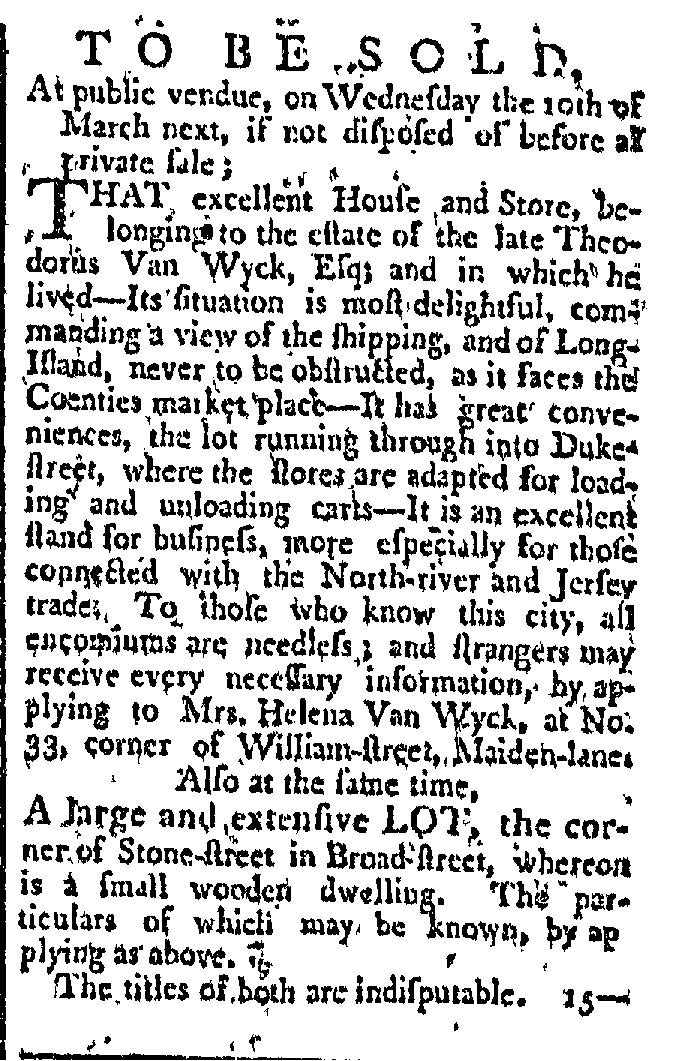
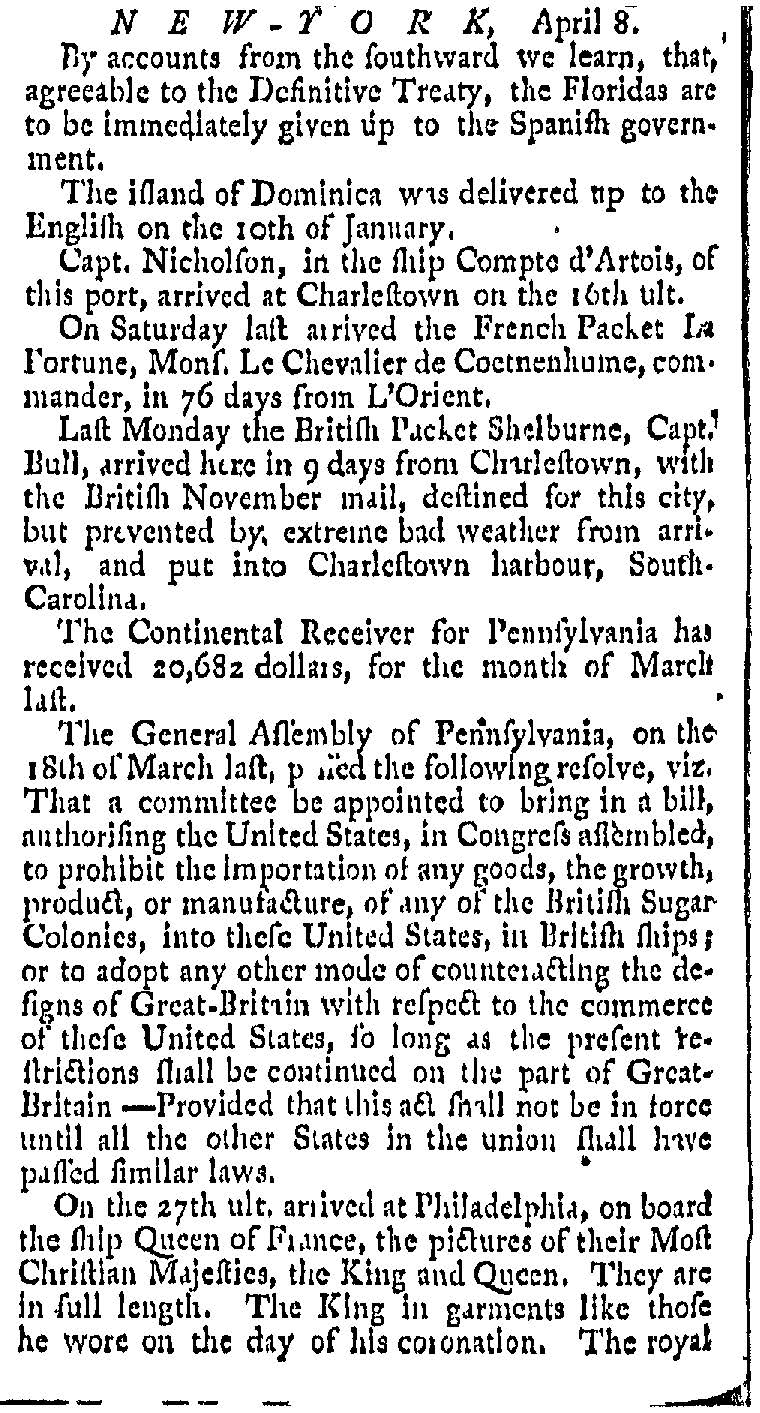

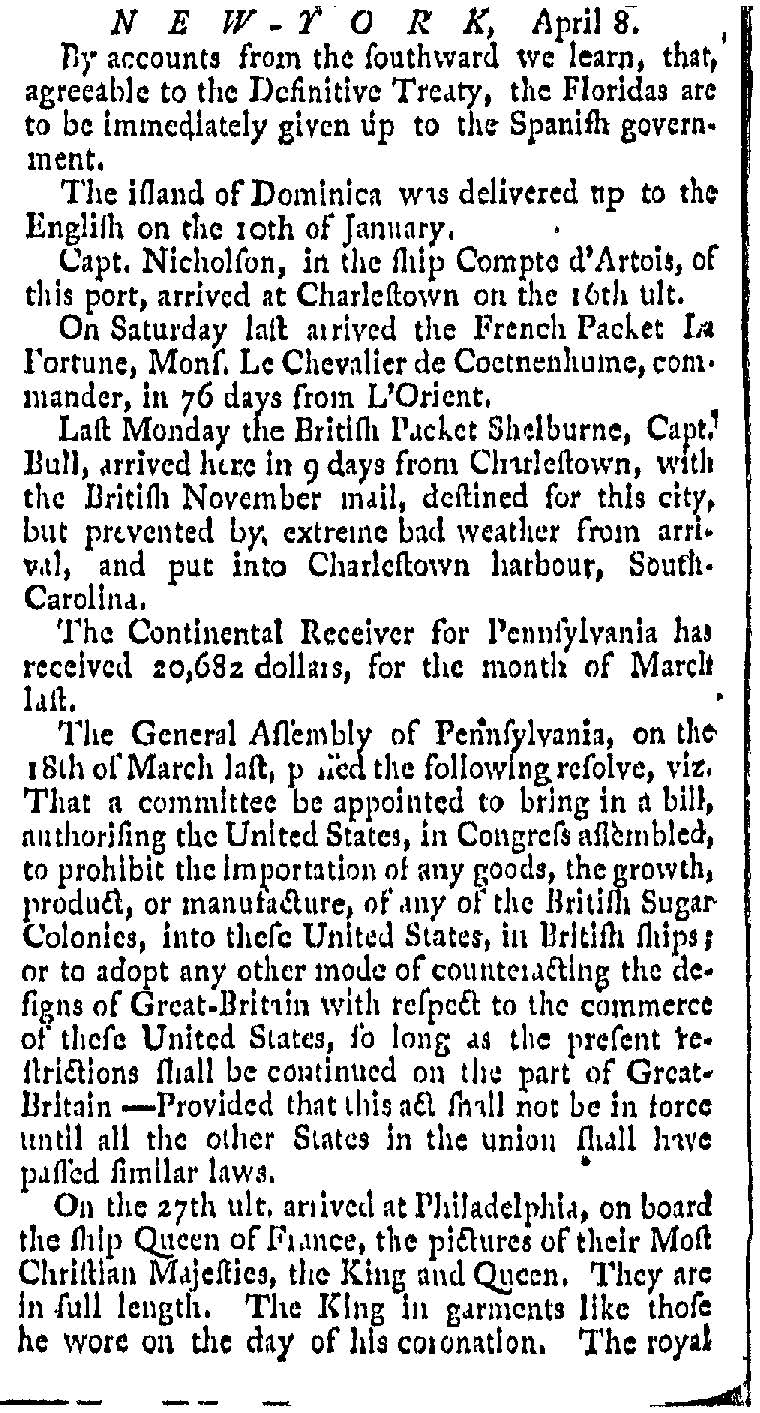
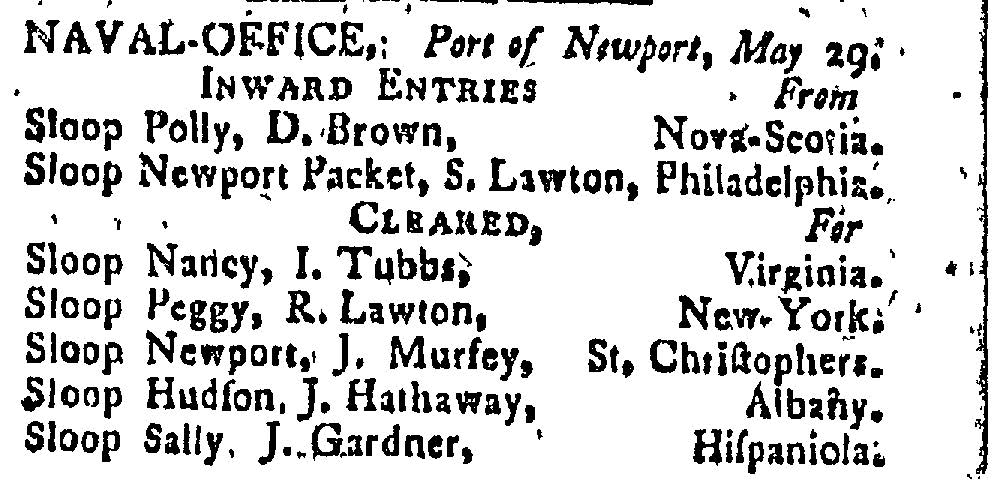
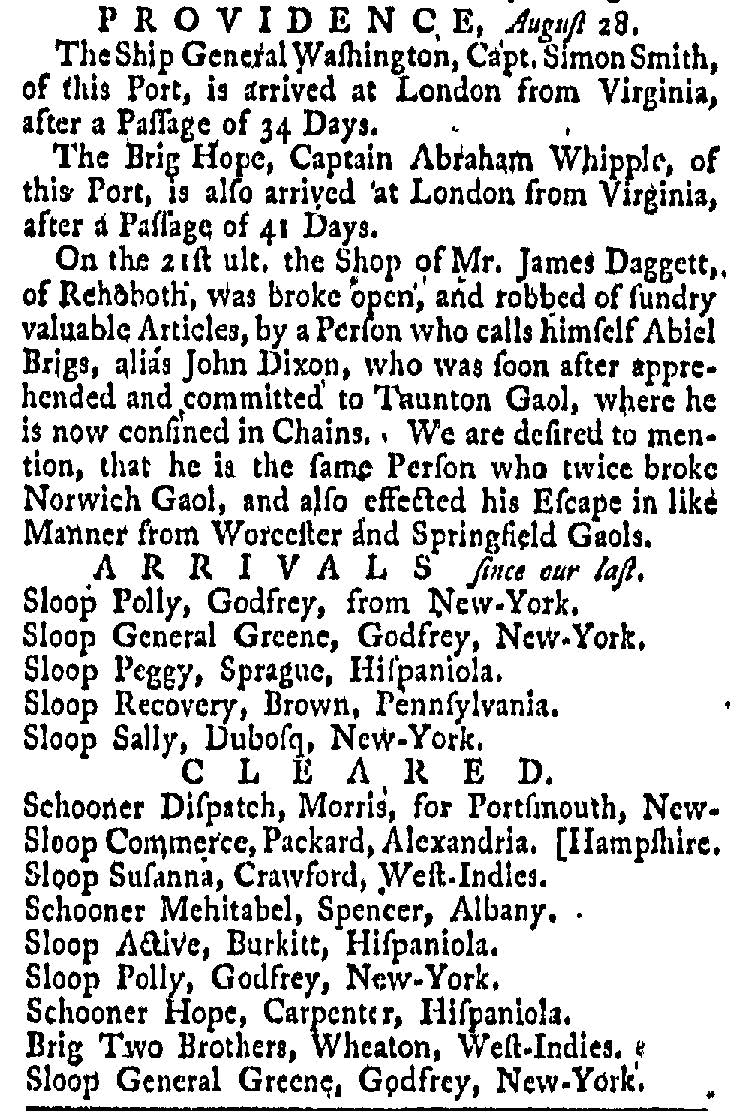
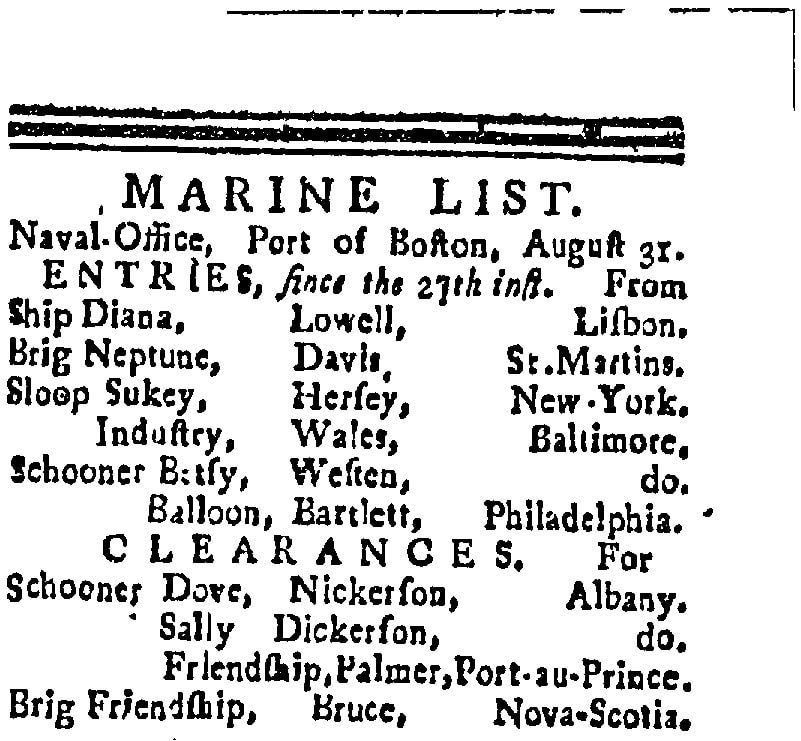
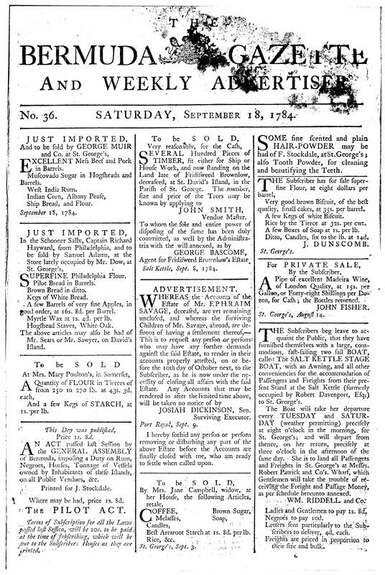
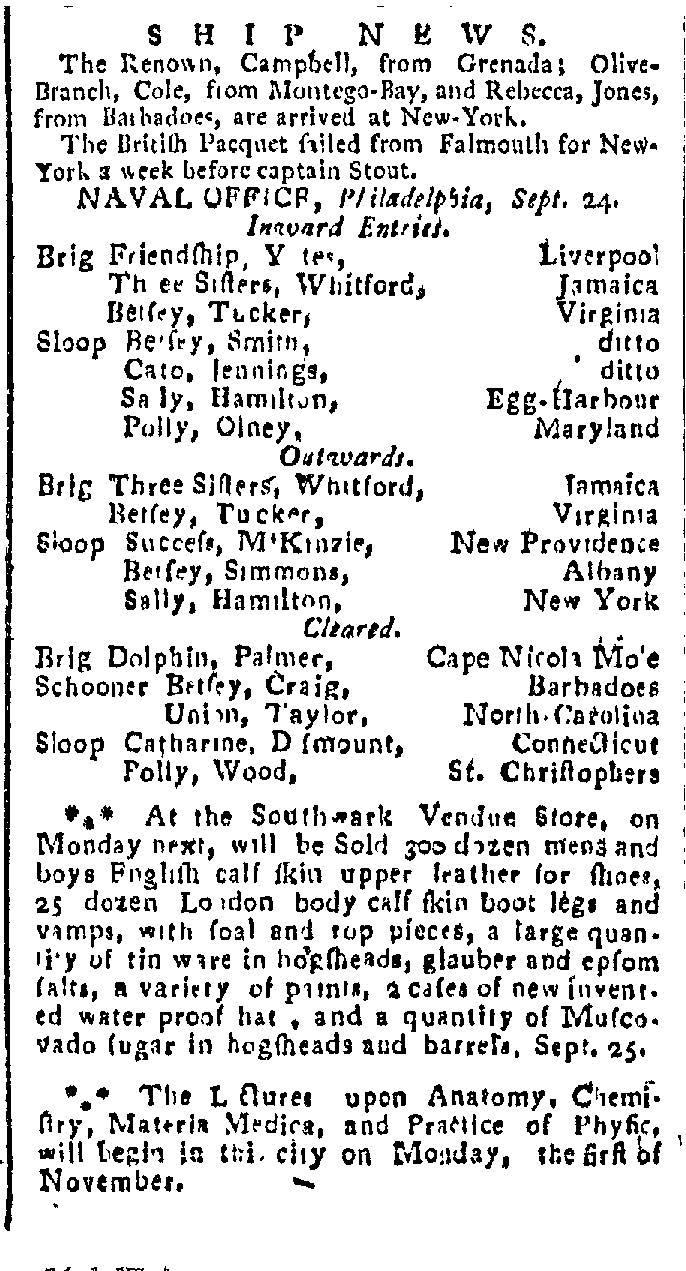
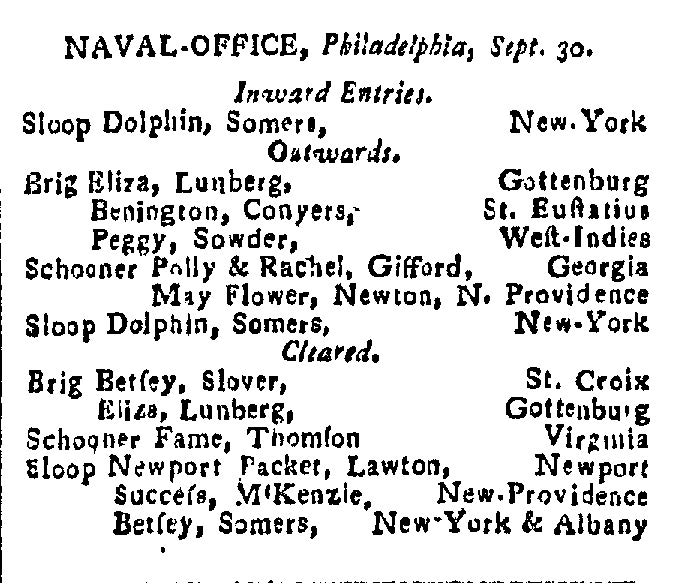
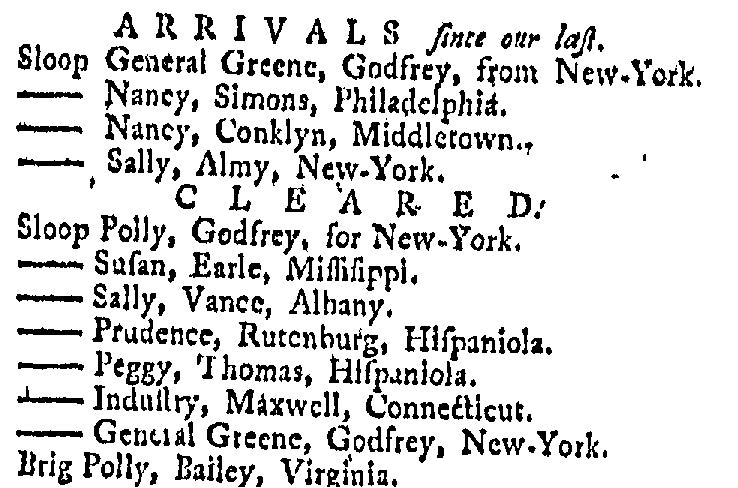
 RSS Feed
RSS Feed